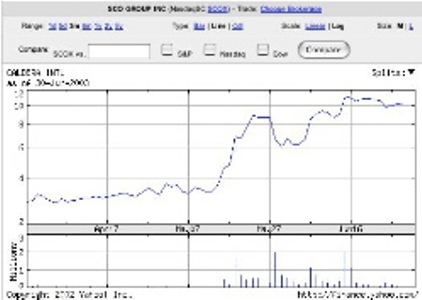
Sun Comes Out From Behind the Clouds
By Pamela Jones
Groklaw
July 10, 2003
Well, gang, it's official. Sun is the 2nd licensee, just as we suspected. The
very alert Stephen Shankland has an article here [ http://news.com.com/2100-1016_3-1024633.html?tag=fd_top
] which clears up all doubt, which a reader "quatermass" brought to my attention:
"The pact, signed earlier this year, expanded the rights Sun acquired in 1994 to
use Unix in its Solaris operating system. But there's more to the relationship:
SCO also granted Sun a warrant to buy as many as 210,000 shares of SCO stock at
$1.83 per share as part of the licensing deal, according to a regulatory document
filed Tuesday."
We reported here back on June 16 [ http://radio.weblogs.com/0120124/2003/06/16.html
], in "SCO's Quarterly Report: UNIX is Mine, All Mine", that the 2nd licensee had
that perk, when I wrote in detail about the quarterly report:
"In connection with one license agreement SCO says they 'granted a warrant to the
licensee to purchase up to 210,000 shares of our common stock, for a period of five
years, at a price of $1.83 per share. This warrant has been valued, using
the Black-Scholes valuation method, at $500,000. Because the warrant was issued
for no consideration, $500,000 of the license proceeds have been recorded as warrant
outstanding and the license revenue reduced accordingly.'"
Now that we know who it is, doesn't it make your stomach turn? No consideration?
The only other question now is: did the two companies plan this whole thing from
the start? We'll know when the code is identified. If it turns out to be Solaris
code, that will indicate if the "Solaris trap" was deliberately baited.
There has always been an alertness and concern in the open source community that
some proprietary company would try to sneak some code into GNU/Linux, just to create
an opportunity to sue for infringement.
For example, aside from the warning about the Solaris Trap [ http://linuxtoday.com/news_story.php3?ltsn=1999-10-04-011-04-PSB
], there was another occasion when proprietary code was released, although in that
case it was allegedly crackers breaking in to Microsoft and stealing it, back in
2000. I always did wonder about the truthfulness of that report and even if it were
true, I wondered why Microsoft would reveal it to the press. Companies typically
try to keep something like that quiet. FSF attorney Moglen immediately put out a
statement [ http://www.linuxjournal.com/article.php?sid=5097 ], warning everyone
not to accept any offers to even look at the MS code. For the same reason, programmers
are advised not to participate in "shared source" or to sign any NDAs.
I am, obviously, making no allegations. Not now, not yet. But my eyes are wide open
and I'll be watching. For one thing, it'll be interesting to see if Sun gets those
210,000 shares it has the right to, at $1.83. I'm guessing they will, and that that
is why they have come out of the closet. How very foresightful to ask for such a
right in a licensing deal back in February. Whatever could the parties to that deal
have been basing that clause on, do ya suppose?
They might as well get in on the action. A lot of folks in this loathesome tale
are making out like bandits. I'm going to create a SCO Stock buy and sell page,
to keep a record. Happily, the SEC is public information. There is only so much
hiding you can do from them.

Oh, one more thing in the Shankland piece. SCO says it is registering for copyrights. They say it will take six months, in order to prove they have the rights. One thing I know for sure. It isn't the Copyright Office that takes six months. Registering for a copyright can be done by getting the form [ http://www.copyright.gov/register/literary.html ] over the internet in five minutes, plus a followup paper mailing. Your copyright is effective when they receive it if everything is in order. Maybe everything wasn't in order. The certificate may take 4 or 5 months to get sent to you, but you have the copyright immediately. Something isn't being said about this chain of ownership business. Maybe that explains the delay in announcing the new licensing plan. You can't sue for damages under copyright law unless you have registered [ http://www.copyright.gov/circs/circ1.html#cr ].
10:02:26 PM
Copyright 2003 http://radio.weblogs.com/0120124/ - http://creativecommons.org/licenses/by-nc-nd/3.0/